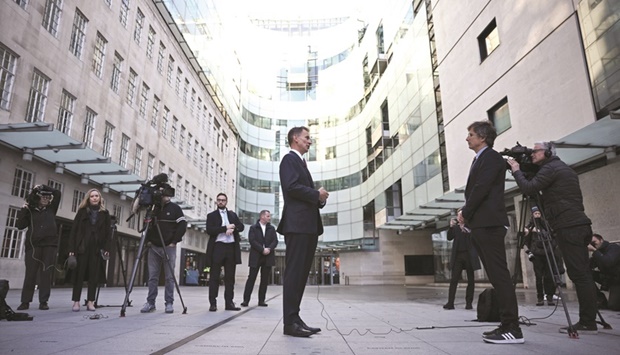
Britain’s new finance minister yesterday warned of looming tax hikes as he admitted to “mistakes” made in a disastrous budget that still threatens to bring down Prime Minister Liz Truss.
“Truss fights for survival,” The Times newspaper headlined a day after she forced chancellor of the exchequer Kwasi Kwarteng to carry the can for market turmoil sparked by their budget on September 23.
The Times, Telegraph and other newspapers reported that senior Conservative members of parliament were still plotting to unseat Truss, possibly within days, aghast at the party’s collapse in opinion polls since she replaced Boris Johnson on September 6. New chancellor Jeremy Hunt, a former foreign secretary seen as a Tory centrist, made clear he was ripping up the strategy that brought Truss to 10 Downing Street. “There were mistakes,” acknowledged Hunt, whom one ally called the government’s new “chief executive” – with Truss now relegated to the role of back-seat chairwoman.
Hunt said Kwarteng and Truss had erred in trying to cut taxes for the highest earners, and in presenting their plan without independent forecasts from the Office for Budget Responsibility. “The prime minister’s recognised that, that’s why I’m here,” Hunt told Sky News.
In one of his first acts on taking office Friday, the new chancellor spoke to Bank of England governor Andrew Bailey, who has had to stage costly interventions to calm febrile bond markets.
Briefing reporters in Washington, Bailey said yesterday: “I can tell you there is a very clear and immediate meeting of minds on the importance of stability and (fiscal) sustainability.”
Tax cuts were the centrepiece of the ill-starred budget announced by Kwarteng and Truss. But they were financed through billions in extra borrowing, causing panic on financial markets at the prospect of higher inflation, which has already left British households in the grip of a cost-of-living crisis.
“We will have some very difficult decisions ahead,” Hunt said, warning that “all government departments” face spending curbs including welfare, health and defence.
“And some taxes will not be cut as quickly as people want. Some taxes will go up.” Hunt confirmed he would deliver a new fiscal statement on October 31, agreeing on BBC radio that he had a “clean slate” to start afresh despite Truss’s election-winning promises to rank-and-file Conservatives. Soon after, on November 3, the Bank of England will hold its next rate-setting meeting.
In a separate speech yesterday, Bailey warned anew that the central bank would “not hesitate” to raise rates to keep soaring inflation under control, threatening more pain for UK households and businesses after the botched budget.
Truss dismissed Kwarteng hours after he had rushed home early from international finance meetings in Washington, and she staged another U-turn in acquiescing to a significant rise in profits tax levied on companies.
At a subsequent Downing Street news conference, the prime minister took only four questions, glancing nervously around the room and delivering terse replies before abruptly leaving after just over eight minutes.
“Robotic, hesitant, tone-deaf, defiant and still utterly convinced of the purity and necessity of her mission, Liz Truss killed off her political career in a matter of minutes,” Times columnist Jenni Russell wrote.
Asked why she herself should not resign, Truss said she was “absolutely determined to see through what I have promised” – but her comments only served to depress the pound and bond markets further.
Former Conservative leader William Hague said Truss’s premiership now “hangs by a thread”, while ex-chancellor Philip Hammond said she had “thrown away years and years of painstaking work” to establish the party’s record for economic competence.
But with the opposition Labour party surging in the polls, Welsh Secretary Robert Buckland warned his restive colleagues against “throwing another prime minister to the wolves”.
Labour leader Keir Starmer accused Truss of “clinging on”, and demanded an early general election. “There are no historical precedents for what they have done to our economy,” he said in a speech yesterday.






